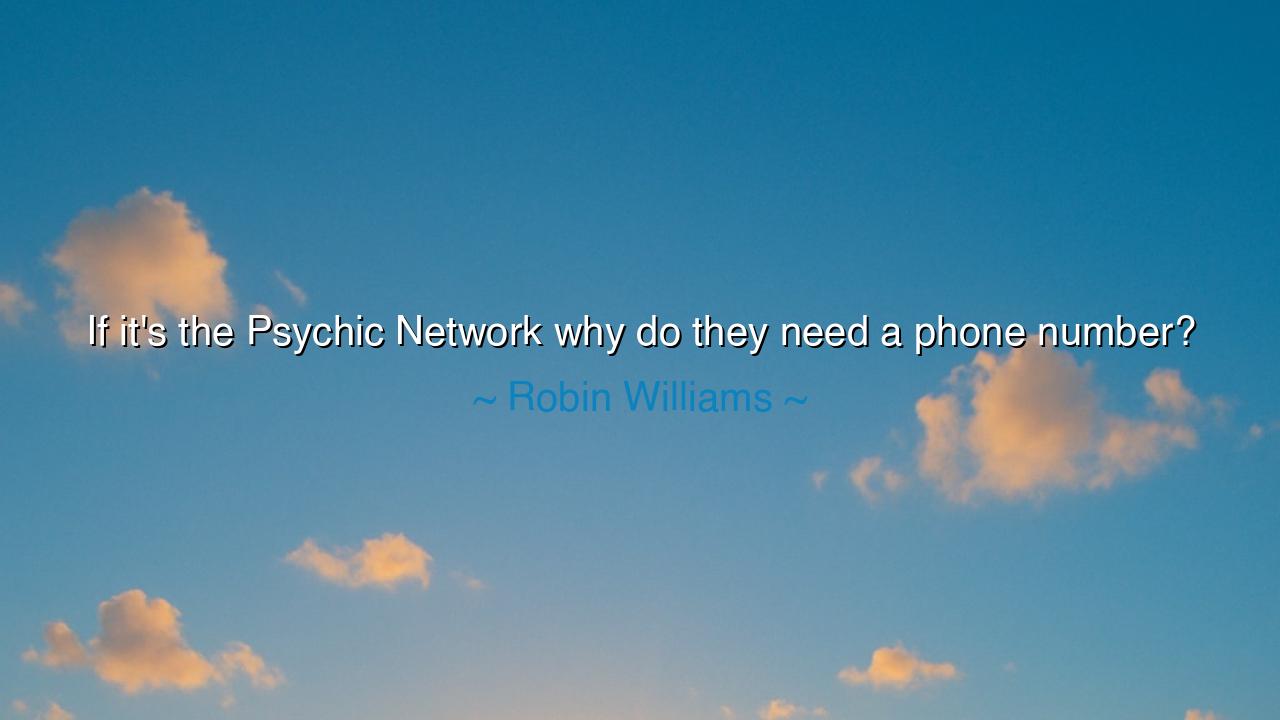
If it's the Psychic Network why do they need a phone number?






The great jester-philosopher Robin Williams, ever the mirror of the human condition, once asked, “If it’s the Psychic Network, why do they need a phone number?” What sounds at first like a passing joke is, in truth, a parable cloaked in laughter — a question as old as reason itself, echoing the eternal struggle between belief and skepticism, faith and evidence, illusion and truth. In one line of mischief, Williams unmasked not merely the absurdity of a psychic hotline, but the deeper irony of humanity’s need to trust in what it knows may not be true. His humor was his wisdom; his laughter, a lamp that illuminated the foolishness we carry with such solemn faces.
To understand the heart of this saying, we must see beyond the jest. The Psychic Network, a modern oracle promising visions of destiny for a price, is but a symbol of the age-old desire to know the unknown — the longing to peek behind the curtain of tomorrow. In mocking it, Williams was not scorning faith itself, but rather the human tendency to outsource it — to believe in prophets who cannot see, to follow guides who need directions. His question — “why do they need a phone number?” — is not about telephones or psychics; it is about contradiction, about the blindness of those who claim sight. It is the laughter of Diogenes reborn, holding up a lamp at noon and declaring, “I am looking for an honest man.”
In ancient times, the oracles of Delphi spoke in riddles, their words steeped in incense and mystery. Kings and warriors came seeking certainty — yet the oracle gave them ambiguity instead. “If you go to war,” said the priestess to Croesus, “you will destroy a great empire.” He took it as a promise of victory, but it was his own empire that fell. So too, the Psychic Network of Williams’s age sold prophecy to those unwilling to bear uncertainty. And so, through laughter, he offered the timeless truth: that wisdom does not come from predicting the future, but from living bravely within its uncertainty. The wise do not ask others to see for them — they open their own eyes.
Beneath the veil of comedy, Robin Williams carried a philosopher’s fire. His jest reminds us that true vision is inward. Those who claim supernatural foresight often cannot see the contradictions in their own words; they speak of destiny, yet need data; they promise connection, yet demand a number to dial. The irony is profound — and yet, it is not theirs alone. It belongs to all who seek shortcuts to truth, all who crave knowledge without understanding, power without humility. His laughter is not cruel, but compassionate — the kind that awakens, not wounds.
Consider also the tale of the emperor’s new clothes. When the ruler paraded naked through his city, fooled by tailors who sold him invisible garments, it was the innocence of a child that broke the spell: “He isn’t wearing anything at all!” Williams’s quip carries that same innocent clarity — the courage to laugh where others bow, the boldness to say what all suspect but none will admit. “If they were truly psychic,” he says, “they would not need to call.” In his laughter is revelation — that truth need not be grim to be powerful; sometimes it arrives wearing a clown’s face.
Thus, the wisdom to draw from this is simple and yet profound: question what claims certainty. In a world full of voices selling foresight and miracle, guard your reason as the ancients guarded their fire. Do not despise wonder — for wonder is sacred — but temper it with discernment. Believe in possibility, but beware of pretense. For wisdom is not found in those who promise to see your path; it is found in walking that path yourself, stumbling, learning, and rising again.
Therefore, let laughter be your compass, and curiosity your guide. When the world offers you prophets with phone numbers, smile — not with scorn, but with understanding. Know that the divine spark of truth does not come through a hotline, nor through mystics for hire, but through the courage to question and to think. Robin Williams, like the wise fools of old, reminds us that humor is the truest prophecy — for it reveals, in jest, the truths we are too afraid to say aloud. And so, through his laughter, he gives this gift: the call to wake up, to see, and to seek the genuine — no phone number required.






AAdministratorAdministrator
Welcome, honored guests. Please leave a comment, we will respond soon